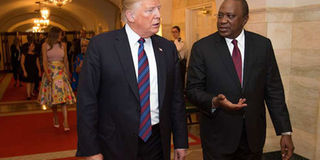US official coming to Kenya to discuss huge potential aid project

US President Donald Trump (left) and Kenya's President Uhuru Kenyatta at the White House on August 28, 2018. PHOTO | FILE | NATION MEDIA GROUP
What you need to know:
Kenya has failed the MCC’s eligibility tests for more than a decade, largely because of rampant corruption.
But the US government-sponsored MCC decided last month to qualify Kenya for a “threshold programme” that will likely carry funding of between $20 million (Sh2 billion) and $30 million (Sh 3 billion).
The money to be given to Kenya through that programme would be used to promote additional gains in the country’s efforts to limit graft.
The head of a special US development programme is due in Kenya next week to hold initial talks on the country’s potential eligibility for project funding that could total billions of shillings.
Sean Cairncross, CEO of the Millennium Development Corporation (MCC), said in a press briefing on Thursday that Kenya is making “excellent progress” toward meeting criteria for inclusion in the programme.
Kenya has failed the MCC’s eligibility tests for more than a decade, largely because of rampant corruption.
But the US government-sponsored MCC decided last month to qualify Kenya for a “threshold programme” that will likely carry funding of between $20 million and $30 million.
The money to be given to Kenya through that programme would be used to promote additional gains in the country’s efforts to limit graft.
Successfully completing this initial step could result in Kenya being chosen for a “compact” with MCC. Such an arrangement, usually focused on infrastructure development, involves an MCC grant averaging about $350 million, Mr Cairncross said.
Established in 2004 during George W Bush’s presidency, the Millennium Challenge Corporation conditions its assistance on countries’ performance in “ruling justly”, following free-market economic policies, and investing in health, education and environmental initiatives.
Since its inception, MCC has awarded a total of more than $8 billion to 25 developing countries, including 13 on the African continent.
Kenya must make additional progress in controlling corruption before it can be deemed eligible for an MCC compact, Mr Cairncross noted. The country’s standing in that regard is determined by assessments on the part of the World Bank and other “third-party data sources,” the MCC director said.
Corruption does not have to be eradicated in order for Kenya to qualify for an MCC compact, Mr Cairncross told reporters. Eligibility is assessed on the basis of a “trend toward dealing with that corruption and a willingness to engage government resources and political will to take those issues on,” he said.
This is not the first threshold programme for which Kenya has been chosen.
It entered into an initiative of that type in 2007 that was aimed at reforming the country’s public procurement systems, improving health service and delivery, and enhancing the monitoring capacity of government and civil-society organisations.
Despite some progress on each of those fronts, Kenya was still falling short of MCC eligibility standards when the first threshold programme concluded in 2010.
“Kenya is an important partner in East Africa,” the MCC said in December in announcing the country’s approval for a second threshold programme.
That MCC move likely reflects Washington’s aim of countering the influence China has gained in Kenya through its large-scale infrastructure investments in recent years.




